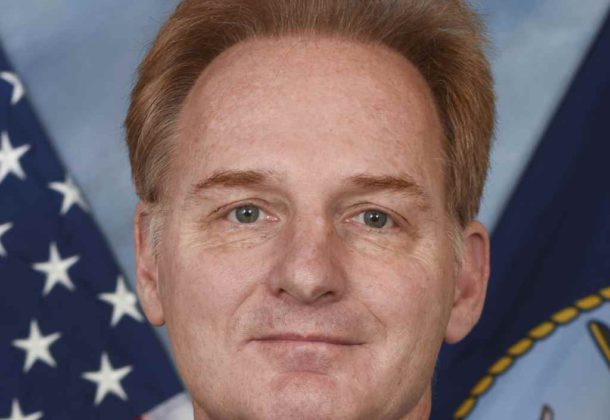Under Secretary of the Navy Headlines TPP Dinner

The opening and closing of Under Secretary of the Navy Thomas B. Modly’s remarks at The Patuxent Partnership’s annual dinner, were pointed and heartfelt. Americans need, now more than ever, to believe we are the “good guys.”
After that most important issue, Mr. Modly offered his Letterman-styled list of the top 10 concerns that keep him up at night, except he is too tired at the end of the day to be kept up at night. But first, he has learned that he needs to explain precisely what his job is, as Under Secretary of the Navy.
“I’m like the XO of the Navy,” he said, prompting some groans and laughter. And after a capture-the-flag story of sailors’ hijinks to describe the depth of feeling held for XOs, he concluded, with apparent understatement, “We’re not here to make friends.”
With that in mind, number 10 on Mr. Modly’s list of concerns is the 355-ship count now required by law. In addition to the increasing difficulty to categorize what is a “ship,” in this time of inter-operative systems, is the reality that, as ships are currently counted, there is only room in the budget to sustain 305.
Number nine, is speed. If it takes eight years to go from concept to deliverable, 80 percent of the deliverables will be obsolete upon arrival.
Number eight is information, spiking in importance as this information revolution continues to accelerate. The Navy asked Congress for a fourth Assistant Secretary for Data and Information. No one currently, Mr. Modly said, is senior enough to manage this “huge void.”
Number seven is cost. An aircraft carrier today costs $13 billion, a fighter aircraft runs $90 million to $100 million. A carrier and its associated systems used to represent 14 percent of the budget, now the percentage is 31.
Number six is the first completed audit of all of the Navy’s property, which is opening opportunities and delivering cost savings. One discovery was $19 million in requisitioned parts stored in a warehouse the Navy didn’t know it owned. The parts have been put to use.
Number five is education, among his personal priorities, Mr. Modly said. Coordinating educational opportunities within a Naval University System is underway and education’s previously paltry budget is now a priority budget. This is not an altruistic, but strategic goal. “The ability to think in unpredictable situations is the difference between victory or loss,” he said. “This is where technology and strategy come together.”
Number four is the warriors, those heroes he praised at the start and again at the conclusion of his remarks. Some of our troops have been at war for 17 years. Improving their lives and their families is always a priority.
Number three is about the adversaries the United States faces today, which beyond Russia and China is a list “expanding more than you think.” The pressures facing the United States’ world relationships are not only military. US adversaries are providing larger and higher caliber infrastructure investments than America had been providing.
Number two is the universal concern about time and the lack of it. “I’ve been a year and a half in this job and figure I have a year and a half to go.” In that time he hopes to establish a path to address his list of 10, “so for whoever inherits [this job] after me, some things make sense.”
As for his top concern, he came full circle, back to the American “capacity to serve a cause larger than self.” That capacity is fueled by “memories,” he said, “the collective memories of the nation. That’s what makes us unique.”
Watch former President Ronald Reagan’s Normandy speech upon the 40th anniversary of D-Day, he encouraged. “He tapped what America believes in its heart, what was meant that day [in Normandy] … It was real, a collective memory. … (What) keeps me up every hour is that we may be losing that collective memory.”
“Faith and belief,” President Reagan says in his Normandy speech, “loyalty and love. Faith that what they were doing was right, faith they fought for all humanity … pray God we have not lost the knowledge that there is a profound moral difference between the use of force for liberation and the use of force for conquest.”
“We are not perfect guys,” Mr. Modly quoted former Secretary of Defense James Mattis, “but we are the good guys.”
“Now,” Mr. Modly said, “more than ever, we need to believe it’s the truth.”
About The Patuxent Partnership
The Patuxent Partnership is a nonprofit member organization that fosters collaboration between government, industry, and academia to advance education through STEM-based initiatives; to advance technology through speaker programs, forums, and networking; to advance science and technology transfer through the exchange of ideas, information, and data related to technologies; and to increase workforce development through an array of initiatives.
To learn more about The Patuxent Partnership and its programs, visit its Leader member page.




















